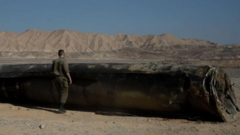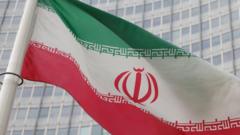The International Atomic Energy Agency has ruled that Iran is not complying with nuclear obligations, coinciding with fears of a potential military strike by Israel.
# Iran's Nuclear Compliance Challenged by International Atomic Energy Agency

# Iran's Nuclear Compliance Challenged by International Atomic Energy Agency
The IAEA's recent resolution against Iran raises concerns amid escalating tensions in the region.
In a historic move after two decades, the IAEA board declared Iran's failure to provide crucial nuclear activity information, highlighting escalating geopolitical tensions.
The International Atomic Energy Agency (IAEA) declared Thursday that Iran is in violation of its nuclear nonproliferation commitments, marking the first such resolution against the country in two decades. This decision came during a time of intense scrutiny regarding Iran’s nuclear program, with U.S. and European officials suggesting that Israel may be preparing for a military strike against Iran.
The IAEA's announcement pointed to Iran’s repeated failure to disclose information related to undeclared nuclear materials and activities located at several unidentified sites. The resolution to condemn Iran's actions was initiated by the United States, along with support from Britain, France, and Germany, and passed with a significant majority—19 votes from the 35-member board. However, notable opposition arose from Russia, China, and Burkina Faso, while 11 countries chose to abstain from voting and two did not cast their votes at all.
In response to the looming vote, Iran expressed vehement opposition, threatening to withdraw from the Nuclear Nonproliferation Treaty (NPT) altogether if necessary. The development comes amidst precarious and ongoing negotiations concerning Iran's nuclear program between U.S. officials and Iranian representatives.
This situation continues to develop, with world leaders closely watching the repercussions of the IAEA's resolution and Iran's next moves.
The International Atomic Energy Agency (IAEA) declared Thursday that Iran is in violation of its nuclear nonproliferation commitments, marking the first such resolution against the country in two decades. This decision came during a time of intense scrutiny regarding Iran’s nuclear program, with U.S. and European officials suggesting that Israel may be preparing for a military strike against Iran.
The IAEA's announcement pointed to Iran’s repeated failure to disclose information related to undeclared nuclear materials and activities located at several unidentified sites. The resolution to condemn Iran's actions was initiated by the United States, along with support from Britain, France, and Germany, and passed with a significant majority—19 votes from the 35-member board. However, notable opposition arose from Russia, China, and Burkina Faso, while 11 countries chose to abstain from voting and two did not cast their votes at all.
In response to the looming vote, Iran expressed vehement opposition, threatening to withdraw from the Nuclear Nonproliferation Treaty (NPT) altogether if necessary. The development comes amidst precarious and ongoing negotiations concerning Iran's nuclear program between U.S. officials and Iranian representatives.
This situation continues to develop, with world leaders closely watching the repercussions of the IAEA's resolution and Iran's next moves.





















